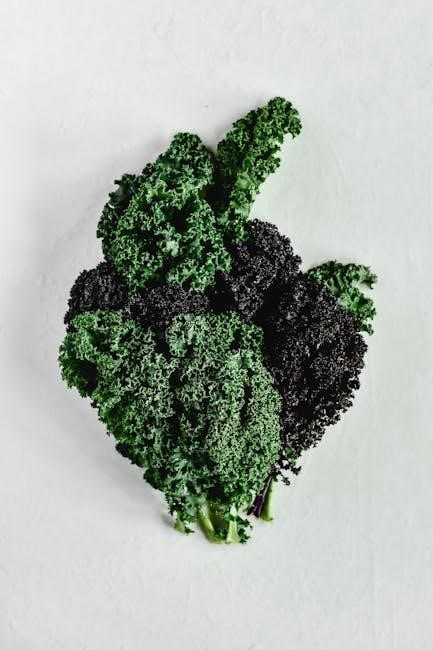Endometriosis is a chronic condition causing pain and inflammation. A 4-week diet plan emphasizes nutrition’s role in managing symptoms‚ focusing on anti-inflammatory foods‚ blood sugar balance‚ and lifestyle adjustments to reduce inflammation and alleviate pain‚ improving overall well-being.
1.1 Understanding Endometriosis and Its Symptoms
Endometriosis is a chronic condition where uterine tissue grows outside the uterus‚ causing inflammation‚ pain‚ and discomfort. Common symptoms include pelvic pain‚ heavy menstrual bleeding‚ fatigue‚ and infertility. These symptoms can significantly impact daily life‚ making it essential to explore holistic approaches like dietary changes to manage discomfort and improve quality of life effectively.
1.2 How Nutrition Impacts Endometriosis Management
Nutrition plays a crucial role in managing endometriosis by reducing inflammation and alleviating symptoms. An anti-inflammatory diet helps minimize pelvic pain and heavy bleeding‚ while specific foods can influence hormone levels and immune response. Strategic dietary choices can significantly improve quality of life and support overall health‚ making nutrition a key component in managing endometriosis effectively.

Overview of the 4-Week Endometriosis Diet Plan
This structured 4-week program focuses on anti-inflammatory recipes and blood sugar balancing to help manage endometriosis symptoms. It provides a clear‚ non-restrictive guide for dietary changes and lifestyle adjustments to support healing and improve overall well-being.
2.1 Structure of the 4-Week Meal Plan
The 4-week meal plan is designed to be anti-inflammatory and non-restrictive‚ focusing on balanced nutrition. It includes daily meal ideas for breakfast‚ lunch‚ dinner‚ and snacks‚ with a focus on eliminating inflammatory foods and incorporating healing recipes. The plan is structured to gradually introduce dietary changes‚ helping to manage symptoms like inflammation and pain effectively over time.
2.2 Benefits of an Anti-Inflammatory Diet
An anti-inflammatory diet helps reduce inflammation‚ alleviate pain‚ and improve endometriosis symptoms. It promotes healing by balancing hormones and boosting immune function. By focusing on nutrient-rich foods‚ this approach supports overall well-being and can lead to long-term symptom management‚ enhancing quality of life naturally.
Key Dietary Principles for Managing Endometriosis
Focusing on anti-inflammatory foods‚ reducing trigger foods‚ and balancing blood sugar are key principles. These dietary strategies help alleviate symptoms‚ reduce inflammation‚ and support overall well-being.
3.1 Anti-Inflammatory Foods to Prioritize
Prioritize omega-3 rich foods like salmon‚ sardines‚ and flaxseeds‚ which reduce inflammation. Include turmeric‚ ginger‚ and leafy greens for their anti-inflammatory properties. Cruciferous vegetables and berries also support immune function and reduce oxidative stress‚ aiding in symptom relief and overall well-being.
3.2 Foods to Avoid or Limit
Limit red meat‚ processed foods‚ and sugary items‚ as they can trigger inflammation. Avoid dairy‚ gluten‚ and refined carbohydrates‚ which may worsen symptoms. Reducing alcohol and caffeine intake is also beneficial. Eliminating these foods can help alleviate pain and inflammation‚ supporting overall health and symptom management.
3.3 Importance of Blood Sugar Balancing
Balancing blood sugar is crucial for managing endometriosis‚ as fluctuations can worsen inflammation and symptoms. Focus on whole‚ nutrient-dense foods like vegetables‚ lean proteins‚ and whole grains to stabilize blood sugar levels. Avoid refined carbohydrates and added sugars‚ which can spike insulin and inflammation. Incorporating fiber and healthy fats helps regulate sugar absorption and supports overall hormonal balance.

Foods to Eat More Of
Focus on anti-inflammatory foods to reduce endometriosis symptoms. Prioritize omega-3 rich foods like fatty fish‚ leafy greens‚ and berries‚ as well as whole grains and fiber-rich foods for better symptom management.
4.1 Omega-3 Rich Foods and Their Benefits
Omega-3 fatty acids‚ found in fatty fish‚ flaxseeds‚ and walnuts‚ reduce inflammation and alleviate endometriosis symptoms. Include wild Alaskan salmon‚ sardines‚ and mackerel in your diet to promote healing and lower pain levels naturally.
4.2 Whole Grains and Fiber-Rich Foods
Whole grains and fiber-rich foods‚ such as quinoa‚ brown rice‚ oats‚ and vegetables‚ promote blood sugar balance and reduce inflammation. They support digestion and provide essential nutrients‚ helping to alleviate endometriosis symptoms and improve overall health. Incorporate these foods regularly to enhance your diet’s nutritional value and support long-term wellness.

Foods to Eat Less Of
Limit red meat‚ processed foods‚ dairy‚ gluten‚ and added sugars to reduce inflammation and manage endometriosis symptoms effectively. These foods can exacerbate discomfort and hinder healing.
5.1 Red Meat and Processed Foods
Limit red meat to once a week and avoid processed meats like salami and sausages. These foods can trigger inflammation‚ worsening endometriosis symptoms. Opt for plant-based proteins or leaner options to reduce pain and inflammation effectively.
5.2 Dairy‚ Gluten‚ and Added Sugars
Reduce or eliminate dairy‚ gluten‚ and added sugars‚ as they can trigger inflammation and worsen endometriosis symptoms. Dairy may promote estrogen production‚ while gluten and sugars can cause digestive discomfort. Opt for non-dairy alternatives‚ gluten-free grains‚ and natural sweeteners. Consider an elimination diet to identify specific sensitivities and tailor your diet accordingly for better symptom management.

Incorporating Supplements and Herbal Remedies
Supplements like omega-3s‚ turmeric‚ probiotics‚ and Vitamin D can reduce inflammation and support gut health. Herbal remedies may also alleviate symptoms‚ complementing the 4-week diet plan.
6.1 Omega-3 Supplements and Turmeric
Omega-3 supplements‚ particularly from fish oil‚ are rich in EPA and DHA‚ which reduce inflammation and pelvic pain. Turmeric contains curcumin‚ a potent anti-inflammatory compound that can alleviate endometriosis symptoms and improve overall well-being when combined with a balanced diet.
Both supplements are recommended in moderation‚ with omega-3s suggested at 1000-2000 mg daily and turmeric at 1-2 teaspoons‚ to enhance the anti-inflammatory effects of the 4-week diet plan.
6.2 Probiotics and Vitamin D
Probiotics support gut health‚ reducing inflammation and improving digestion‚ which is crucial for managing endometriosis symptoms. They promote a balanced microbiome‚ enhancing nutrient absorption and overall well-being.
Vitamin D‚ often deficient in women with endometriosis‚ plays a key role in immune function and hormone regulation. Supplementation with 2000 IU daily can help reduce pain and inflammation‚ supporting the diet plan’s goals.

Meal Planning and Preparation Tips
Weekly meal planning and prepping are essential for maintaining consistency. Focus on hydration‚ portion control‚ and organized grocery lists to simplify your endometriosis-friendly diet journey.
7.1 Weekly Meal Prepping Strategies
Start with a structured weekly plan‚ setting a schedule for breakfast‚ lunch‚ and dinner. Prepare ingredients in advance and portion meals into containers. Incorporate hydration tips and healthy snack options to maintain consistency throughout the week. This approach ensures adherence to the anti-inflammatory diet‚ making it easier to manage endometriosis symptoms effectively.
7.2 Staying Hydrated and Mindful Eating
Stay hydrated with herbal teas and water to support digestion and reduce inflammation. Practice mindful eating by savoring meals slowly‚ avoiding distractions‚ and listening to your body’s hunger cues. Incorporate hydration tips and healthy snacks to maintain energy levels and balance blood sugar‚ promoting a mindful approach to nutrition and symptom relief throughout the day.
Sample Meal Ideas and Recipes
Discover delicious‚ anti-inflammatory recipes tailored for endometriosis management. Enjoy nutrient-rich breakfasts‚ lunches‚ dinners‚ and snacks‚ including omega-3 packed dishes‚ whole grains‚ and fresh vegetables to support healing and reduce symptoms effectively.
8.1 Breakfast Options for Anti-Inflammatory Diet
Start your day with anti-inflammatory breakfasts like chia seed pudding with berries‚ spinach omelettes‚ or avocado toast on whole-grain bread. Smoothies with omega-3 rich flaxseeds‚ kale‚ and pineapple are also excellent choices. These nutrient-dense options help reduce inflammation‚ stabilize blood sugar‚ and provide sustained energy‚ supporting your endometriosis management journey with delicious and healthy meals.
8.2 Lunch and Dinner Ideas
For lunch and dinner‚ opt for grilled fish like salmon‚ paired with quinoa and steamed vegetables. Stir-fries with tofu‚ mixed greens‚ and turmeric are also beneficial. Lentil soups‚ roasted vegetable bowls with olive oil‚ and lean meats like chicken or turkey breast are excellent choices. These meals are nutrient-dense‚ anti-inflammatory‚ and support hormonal balance‚ aiding in symptom relief and overall well-being.
8.3 Healthy Snack Choices
Healthy snacks like almonds‚ pumpkin seeds‚ and fresh berries provide essential nutrients. Sliced apples with nut butter or carrot sticks with hummus are satisfying options. These choices support an anti-inflammatory diet‚ reducing endometriosis symptoms. Opt for whole‚ unprocessed foods to avoid triggers and promote healing. Snacks should be nutrient-dense and easy to prepare.

Tracking Progress and Adjustments
Monitoring symptoms and tracking dietary changes helps identify what works best. Adjustments may be needed based on individual responses‚ ensuring the diet remains effective in managing endometriosis.
9.1 Keeping a Food Diary
A food diary is crucial for tracking meals‚ symptoms‚ and energy levels. By documenting daily intake‚ women can identify trigger foods and monitor progress‚ enabling informed adjustments to their diet plan for better symptom management and overall health outcomes throughout the 4-week program.
9.2 Monitoring Symptoms and Adjusting the Diet
Regularly monitoring symptoms like pain and fatigue helps assess the diet’s effectiveness. Adjustments may include increasing anti-inflammatory foods or reducing triggers. Tailoring the plan based on feedback ensures a personalized approach‚ enhancing symptom relief and promoting long-term well-being through targeted dietary changes.
Adopting an anti-inflammatory diet long-term can significantly improve endometriosis management. Consistency and patience are key to sustaining benefits and promoting overall well-being for a healthier future.
10.1 Maintaining the Diet Beyond 4 Weeks
Maintaining an anti-inflammatory diet beyond four weeks is crucial for long-term endometriosis management. Focus on whole‚ nutrient-rich foods‚ avoid triggers‚ and stay hydrated. Incorporate mindful eating habits and regular meal prepping to sustain progress. Over time‚ these practices become a lifestyle‚ fostering continuous symptom relief and improved overall health. Consistency is key to achieving lasting benefits.
10.2 The Importance of Consistency and Patience
Managing endometriosis requires long-term commitment. Consistency in following the diet helps reduce inflammation and alleviate symptoms over time. Patience is key‚ as noticeable improvements may take weeks. Regularly tracking progress and making necessary adjustments supports sustained motivation and ensures the diet remains effective. Stay dedicated to the plan to achieve lasting benefits and enhance overall well-being.



